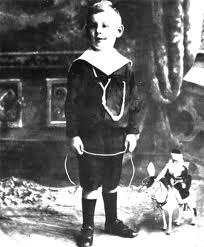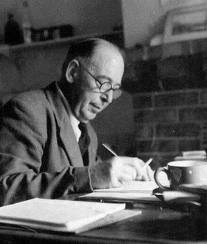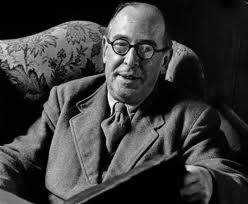 |
| C.S. Lewis during his childhood. (http://www.narniaproducts.com/cslewis.php ()) |
"Always stand up for what you believe in...even if it means standing alone"(Hanks). This quote describes C.S. Lewis' life perfectly; Lewis was never afraid of others opinions allowing him to openly share his beliefs. Lewis' life took many twists and turns that he never expected to happen. His struggles started with his mother's death when he was just ten years old. He was then sent to school at Wynyard in England. Overcoming these obstacles when he was young, C.S. Lewis was able to get a scholarship to Oxford University and studied Medieval and Renaissance English Literature. Before entering school Lewis chose to volunteer in World War 1. In 1931 C.S. Lewis' life changed drastically when he converted to Christianity. Despite growing up in a Christian home, Lewis never really took up the faith and considered himself atheist. In 1929 he had embraced theism that later turned into Christianity. With this newfound faith Lewis started writing books not only on Renaissance literature, but also on his beliefs. The Screwtape Letters, The Chronicles of Narnia, and his science-fiction trilogy are considered some of his most famous works. Lewis married rather late in life, to Joy Gresham in 1956, who unfortunately died four years later of cancer. At age 64, just 6 days shy of his 65th birthday, C.S. Lewis died at his home in England from renal failure. Today Lewis is considered one of the most influential writers of his time and is remembered not only for his Renaissance literature, but also for his writings in defense to the Christian faith. A hero is someone who does not care about others opinion and speaks what they truly believe. C.S. Lewis is more than just a theological writer; he is a man that stood up for his beliefs and shared his Christian values with those around him.
 |
| C.S. Lewis writing. (http://gratefultothedead.wordpress.com/2010/09/15/the-intuitive-medievalism-of-c-s-lewis-a-paper-proposal-for-kalamazoo-2011/ ()) |
Throughout his time writing books Lewis was criticized by many, but he didn't allow those opinions get to him and continued to write about his beliefs. C.S. Lewis had been criticized for different reasons on all of his writings, so it didn't come as a surprise after he wrote the first book in The Chronicles of Narnia series. "Initially when Lewis turned to writing children's books, his publisher and some of his friends tried to dissuade him; they thought it would hurt his reputation as writer of serious works"… "Although they were not well received at first by critics and reviewers, the books gained in popularity through word of mouth. The Narnia books have since sold more than 100 million copies and are among the most beloved books of classic children's literature"(Imbornoni). C.S. Lewis chose to ignore those opinions that he valued greatly and wrote the books anyway. Even though those around him thought writing children's books would hurt his reputation more than help it, Lewis believed that it was time for a change. If Lewis had opted to let himself give into the opinions of others, and not stand up for his beliefs, he would not be as widely known as he is today. Lewis did not let others opinions sway him, and he didn't let the modern movement change the way he wrote books. "A respected authority on medieval and Renaissance literature, Lewis was a traditionalist in his approach to life and literature who opposed the modern movement in literary criticism toward biographical and psychological interpretation. Instead, he practiced and propounded a theory of criticism which stresses the importance of the author's intent, rather than the reader's presuppositions and prejudices"("C(live) S(taples) Lewis"). Even though the world was moving forward in the way of writing Lewis didn't like where it was going. C.S Lewis preferred to go a more traditional route in his writings. He favored writing with the author's intent in might, and not with the readers predetermined opinion. Lewis flawlessly displays that if you believe in something you should stand up for it, no matter how many people disagree with you.
 |
| C.S. Lewis (http://popclassicsjg.blogspot.com/2000/01/cs-lewisnarnia.html ()) |
Through his writing and everyday life Lewis was able to illustrate his beliefs to others in an appealing way. One way Lewis conveyed his beliefs was through his world famous series, The Chronicles of Narnia. "These popular children's fantasies began with the 1950 volume, The Lion, the Witch, and the Wardrobe, a tale centered around Aslan the lion, a Christ-figure who creates and rules the supernatural land of Narnia, and the improbable adventures of four undaunted British schoolchildren who stumble into Narnia through a closet"(Edwards). Lewis' writings of a fictional place with magical characters illustrate his beliefs while still appealing to his audience. C.S. Lewis found a way to be able to engage a greater audience while using characters that symbolize important figures in his faith. We learn how important C.S. Lewis' faith was to him, because he found a way to his talent for writing great literature, to share his faith with others. Lewis not only illustrated his faith through his writings, but also through his important wartime radio broadcasts. "Lewis emerged during the war years as a religious broadcaster who became famous as "the apostle to skeptics," in Britain and abroad, especially in the United States. His wartime radio essays defending and explaining the Christian faith comforted the fearful and wounded, and were eventually collected and published in America as Mere Christianity in 1952"(Edwards). C.S. Lewis' broadcasts were a major part in spreading his faith to those around him. Lewis was able to comfort those in distress from the war by taking a stand and openly talking about his faith. These broadcasts shared the basic concepts of the Christian faith and why it is important. C.S. Lewis allowed himself to be vulnerable by openly talking about his faith and sharing it with others.
C.S. Lewis illustrates all the traits I deem are necessary in order to be considered a hero. A hero to me is someone who is not afraid of other people's opinions, and is willing to make him or herself vulnerable. Lewis did just that; he stood up for his beliefs when other people went with the flow, and he was willing to openly share his Christian faith with others. C.S. Lewis is an inspiration to me and others, because he was always willing to give back to the community, and help other people out. "As the war in Europe raged, the Lewis brothers opened The Kilns as a shelter for several children evacuated from London because of bombing raids by the Nazi Luftwaffe"("C(live) S(taples) Lewis"). Lewis was someone who wouldn't think twice about giving back to those around him. C.S. Lewis displays how it is important even if your life didn't go as exactly as planned, that you should always be willing to help others. Writing about his beliefs makes C.S. Lewis a hero, but it also makes him an inspiration to many. " Lewis, known for his strong Christian beliefs, made no secret that the children's stories were Christian allegories and that Aslan, whose death and resurrection is pivotal to the saga, was a Christ-like figure("Disney to market movie to Christians.") Through writing books on his beliefs Lewis has had a major impact on many people in the world. He has inspired them to go out and not be afraid to tell others about their beliefs. A hero is someone who is willing to put their beliefs out there even if they are the only one that believes that. Are you willing to do that?
Works Cited
C(live) S(taples) Lewis." DISCovering Authors. Detroit: Gale, 2003. Gale Student Resources In Context. Web. 12 Dec. 2011.
"Disney to market movie to Christians." UPI NewsTrack 6 Mar. 2005. Gale Biography In Context. Web. 10 Jan. 2012.
Edwards, Bruce L. "C. S. Lewis: A Modest Literary Biography and Bibliography." Http://personal.bgsu.edu/~edwards/lewisr.html. Web. 10 Dec. 2011.
Imbornoni, Anna-Marie. "C. S. Lewis: The Creator of Narnia - Biography." Factmonster.com.2007. Web. 9 Dec. 2011.
Page created on 1/14/2012 12:00:00 AM
Last edited 1/14/2012 12:00:00 AM
